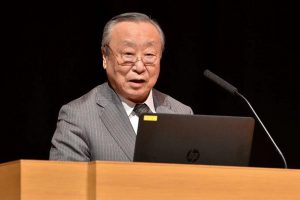2019年1月1日
公益社団法人 日本仲裁人協会
理事長 川村 明
 公益社団法人日本仲裁人協会は、2003年に任意団体として発足し、一般社団法人を経て、2016年公益社団法人として承認され、現在に至っています。仲裁・調停の法律研究、その技術の研さん、ひいては優れた仲裁・調停実務家の養成を目的に掲げ、その結果、日本に優れた仲裁調停制度を整備して内外の紛争解決に力を発揮することを期待されてきました。
公益社団法人日本仲裁人協会は、2003年に任意団体として発足し、一般社団法人を経て、2016年公益社団法人として承認され、現在に至っています。仲裁・調停の法律研究、その技術の研さん、ひいては優れた仲裁・調停実務家の養成を目的に掲げ、その結果、日本に優れた仲裁調停制度を整備して内外の紛争解決に力を発揮することを期待されてきました。
日本仲裁人協会は、今や多くの著名な仲裁法律家を擁し、多数の若手実務家を引き付けて、社会の期待に応えうる大きなパワーになっています。しかし、国内における仲裁件数ということでは、未だブレークしたとまでは言えませんが、2018年、日本国際紛争解決センターや日本国際調停センター京都の華々しい開設により、その業務環境は一新したとも言えます。
社会の関心と信頼が徐々に国際仲裁に集まっているのです。日本仲裁人協会は、このモメンタムを見逃すことなく、日本社会の国際化に貢献する仲裁と調停の制度整備に一層の努力をしていきたいと思います。
Key Note Speech by the JAA President, Akira Kawamura, at Keio Law School’s Symposium on Growing International Arbitration in Japan (12/15/18)
1) Many congratulations, Prof. Kitai, for the opening of the Symposium on “Growing International Arbitration in Japan.” We hold you in high regard and applaud you for your initiatives to develop the international dispute settlement courses in the English language at Keio Law School. It is a very new, inspiring and visionary way of legal education in Japan, and most importantly, it is something that is desperately needed by the present day Japanese society.
2) We, Japan Association of Arbitrators (“JAA”) which I am honored to represent, are very proud to co-host this important symposium with Keio Law School.
3) As you know, we have inaugurated the Japan International Dispute Resolution Centre –Osaka (“JIDRC”) in April this year. This is the first, special international arbitration facility in Japan. We plan to open another Centre in Tokyo, in time before the Tokyo Olympic 2020. Just last month, I attended the grand opening of the Japan International Mediation Center in Kyoto (“JIMC-Kyoto”). It is located within the beautiful campus of Doshisha University and co-sponsored by Doshisha Law School. I am extremely proud and satisfied that JAA was able to complete both of these ambitious projects very successfully this year.
4) JIMC-Kyoto and JIDRC-Osaka marked 2018 as a special year in the history of international dispute resolution law for Japan. Until today, international arbitration was not a common or popular form of dispute resolution in Japan. There were no special arbitration facilities in Japan, at all. By having JIMC-Kyoto and JIDRC, we may say that now we have created great platforms on which the Japanese legal profession can defend the international legal and commercial interests of their Japanese and international clients. Further, they should be the new frontier in dispute resolution for law students to pursue their future careers, too.
5) These facilities have become possible almost only because of the policy support and financial commitments of the Japanese government. The government priorities, the so-called “large-boned economic strategies” (Hone-buto Keizai-seicho-seisaku) announced in 2017 and 2018, took up the internationalization of the Japanese judicial system quite seriously, especially recognizing the importance of international arbitration services for the people and business which spread throughout the world. The policy on international arbitration was stepped up to one of the top priorities on the agenda of the Japanese government by these announcements.
6) More importantly, the function and role of arbitration appears to be getting better understood in Japan today than before as the necessary means of dispute resolution in an international context. Nowadays, we are observing many cases for which arbitration could be the only realistic alternative for the settlement of international disputes. It occurs to me that the recent ruling against some Japanese companies by the Korean Supreme Court relating to the compensation claims of Koreans for war time forced labor could be very illustrative about this point. I trust that the Korean Supreme Court did its best within the frame work of the Korean law and justice system. I am sure that they did what they should do. However, it would be very unlikely enforced by the Japanese court if the order was to be brought in for execution in Japan. It may be a classic case of conflict of justices. The national court system in such cases cannot perfectly function as a neutral forum to provide justice on such serious conflict of legal and cultural questions that go beyond the national borders. We know that this kind of conflict situations are taking place almost every day in the cross border business world. But, international arbitration could provide us with a practical solution to such international conflict situations. Therefore, I believe that for international disputes, arbitration would no longer be an alternative dispute settlement mechanism, but the principal one.
7) Lastly, let me stress, as Hone-buto said, that the education and training of the professionals will be more critical of an agenda than building of such facilities. Therefore we must not lose our primary and fundamental focus on educating and developing strong young global players who are capable of effectively providing dispute resolution services. It is the reason why JAA is working closely with the law schools like Keio and Doshisha. When I was the president of the International Bar Association in 2011 and 2012, I noticed that the major global arbitration centers are dominated by the certain power group of lawyers. They pursue legal doctrines of the common law and conduct the practice exclusively in English languages. I think we should help growing a strong international legal profession in Japan that can compete with them in the global arbitration markets. We should be able to build up dispute settlement forums friendly and suitable to effectively diversified legal cultures. I am very sure that JIMC-Kyoto and JIDRC will be very strong platforms on which new international dispute settlement system may grow.
